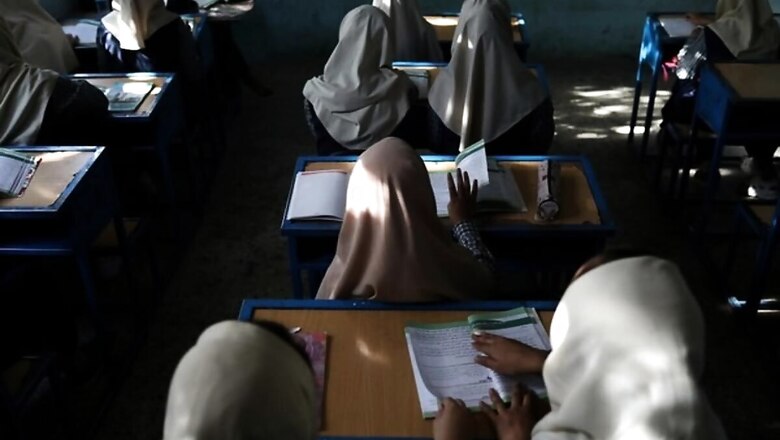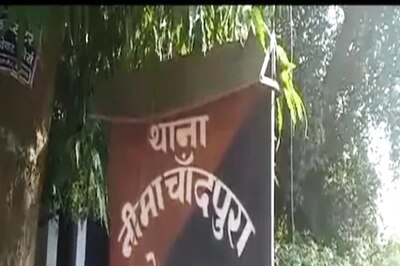
views
Squarely blaming India for disturbing “balance of power” in the region with nuclear tests, accusing Hindus of “organizing Muslim genocide” and of not letting the Kashmir issue settle: the class 10 history book taught in Pakistani schools runs India down as a nation while wrongly portraying historical events. News18 has accessed the textbook, which is developed in line with the national curriculum, published by National Book Foundation (Federal Textbook Board, Islamabad).
The history book titled ‘Pakistani Studies-II’ dives into the administration and formation of successive governments in the state including its relations with the world and immediate neighbours where it repeatedly blames India for disturbing peace in the region. The book is full of similar anti-India and anti-Hindu content.
The first chapter on steps taken by the Nawaz Sharif government to resolve the “Kashmir dispute” labels India “arrogant”. “India was officially invited to resolve the Kashmir dispute, but these efforts did not succeed due to Indian arrogance. Hindu extremists demolished the historic Babri Masjid in 1992 and the National Assembly of Pakistan condemned this brutal incident by passing a resolution,” the text reads.
Further, the book not only blames India for “disturbing the balance of power in the region” but also accuses it of forcing Pakistan to launch a series of nuclear tests. “India conducted three nuclear tests in Pokhran on May 11, 1998, this disturbed balance of power in the region. The government of Pakistan was hard-pressed to reciprocate. Nawaz Sharif made a historic decision to withstand all global pressure and go nuclear. Six nuclear tests conducted at Chaghi (Balochistan) on May 28, 1998, made Pakistan the 7th nuclear power of the world and the first one in the Muslim World. This historic event shattered Indian dreams of hegemony in the region,” it says.
The next chapter on Pakistan’s relations with its neighbours has a line that reads: “Afghanistan on the west and India on the east, are the two neighbours which have always created problems for us.”
The chapter on the history of the “Kashmir dispute” accuses “Hindus and Sikhs of organising genocide against the Muslim population”.
The textbook reads: “Under the Third June Partition Plan, rulers of the princely states were given final authority to decide the future of their respective states….Gandhi, Pandit Nehru and Viceroy Lord Mountbatten also pressurized the Maharaja of Kashmir for accession to India. The Maharaja started to disarm the Muslims living in the areas adjacent to the Punjab border, Poonch and Jammu areas. The Maharaja deployed his troops in the area. The Hindus and the Sikhs started organized genocide of the Muslim population. Half a million Muslims were expelled from their homes in the Hindu and Sikh majority areas of Jammu. Two hundred thousand Muslims lost their lives probably due to cold weather or epidemics, nobody knows how many of them were slaughtered on their way to west Punjab. Those who reach the west Punjab were in miserable condition.”
The chapter explicitly on ‘Indo-Pak Relations’ pitches the Kashmir issue as the major reason behind the two nations not being able to develop friendly relations. The blame for the issue, however, has been entirely put on India including that of the partition of East Pakistan in 1971 (currently Bangladesh).
Sample this: “History of conflict between India and Pakistan due to Kashmir issue dates back to the days of partition in 1947. Due to this issue, the two countries could never develop good neighbourly relations with each other. As soon as, after partition, the Indian forces occupied Kashmir against the will of the people of Kashmir and the unrest in Kashmir turned into full scale revolt. India played a key role in the separation of East Pakistan as well. Indian propaganda about West Pakistan’s exploitation of East Pakistan infused hatred in the people of East Pakistan which resulted in a full scale rebellion in the province and ultimate dismemberment of Pakistan. In 1971 East Pakistan was separated from West Pakistan and a battle between Indian and Pakistani forces was fought on western front as well.”
It then goes on to delve into the history of the Kashmir Issue, tracing it back to undivided India and showing it in a poor light while making anti-Hindu statements at the same time. “The 1947 partition was based on the principle of Hindu and Muslim majority areas, but unfortunately the Hindu Raja of Kashmir did not allow Muslim majority states to be annexed with Pakistan. Obviously the Muslim majority population wanted the state to be a part of Pakistan.”
It further stresses that Kashmir is important to Pakistan due to its “Muslim identity”.
“The Kashmir issue has always been a source of confrontation between India and Pakistan, but India is not ready to give Kashmir people their right of self-determination. Kashmir is like Pakistan’s jugular vein. Geographically, Kashmir has always been a part of the area which is now Pakistan. Above all, Kashmir is important for Pakistan due to its Muslim identity.”
The school textbook even goes to the extent of including Kashmir in the list of states/nations in the world for whose liberation Pakistan has been raising its voice. Under the subhead, ‘Pakistan and World Affairs’, the textbook reads: “During this period Pakistan raised voice in the favour of all these nations. Pakistan’s diplomatic efforts for the right of self-determination of the people of Indonesia, Libya, Morocco, Algeria, Tunisia, Eritrea, Kashmir and Palestine, will always be remembered.”
Prof H Senapaty, who works at NCERT’s regional wing at Bhubaneswar, said that history books for any nation or society cannot show any other nation, religion or its people in a negative light. It has to be just facts and their elaboration, without any exaggeration. “In India, our approach to developing school curriculum is clear cut to be objective. Especially, textbook content on sensitive issues such as Kashmir or partition has to be entirely just on facts, without drawing any interpretations.”
Read all the Latest India News here
















Comments
0 comment